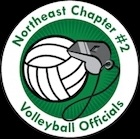The expansion of the coaching zone beyond the end line of the volleyball court and the allowance of one assistant coach to stand and communicate with players headline the new 2023-24 high school volleyball rules changes.
In all, five rules changes were recommended by the National Federation of State High School Associations (NFHS) Volleyball Rules Committee at its annual meeting January 8-10. All rules changes were reviewed and approved by the NFHS Board of Directors.
Rule 2-1-9 was added to define the coaching zone as the area from the libero replacement zone to the area beyond the end line and the sideline extended. In addition to head coaches utilizing the coaching zone, Rule 12-2-6 was changed to allow one assistant coach to stand within the coaching zone during dead-ball situations. The assistant coach standing within the coaching zone may change throughout the match. All other assistant coaches must remain seated.
“The committee felt it was necessary to better define the space in which coaches are allowed to stand and instruct both players on the floor and on the bench while also providing some flexibility for specialized coaching by assistant coaches during dead-ball situations,” said Lindsey Atkinson, NFHS Director of Sports and liaison to the Volleyball Rules Committee.
The wearing of jewelry by players is addressed in a change to Rule 4-1-7, which now states that all jewelry must be removed, except small, secured studs or posts worn above the chin. No jewelry is permitted below the chin, including string bracelets, commemorative bracelets and body jewelry. In addition, taping over jewelry is not permitted. This rules change aligns high school rules with NCAA rules on the wearing of jewelry.
“Other NFHS and volleyball rules codes have been addressing the allowance of jewelry over recent years,” Atkinson said. “The committee’s decision to align with NCAA volleyball jewelry rules was to both minimize the risk of injury by limiting the type and location of jewelry and create consistency for officials and student-athletes.”
Beginning in 2028, uniform numbers with a leading zero will not be permitted. This change to Rule 4-2-4b eliminates confusion when signaling numbers and aligns NFHS rules with other rules codes.
The procedure for requesting a substitution was amended in Rule 10-2-1. The head coach may now verbally request a substitution to an official in addition to visually signaling.
A complete listing of the volleyball rules changes will be available on the NFHS website at www.nfhs.org. Click on “Activities & Sports” at the top of the home page and select “Volleyball.”
According to the most recent NFHS High School Athletics Participation Survey, volleyball is the second-most popular sports for girls (trailing track and field) with 454,153 participants in 16,532 schools nationwide. In addition, there are 66,487 boys participating in the sport at 2,682 schools.
